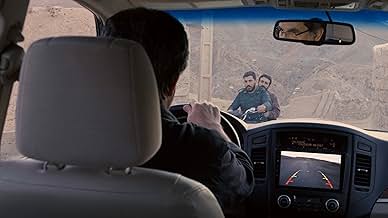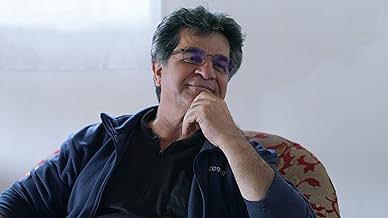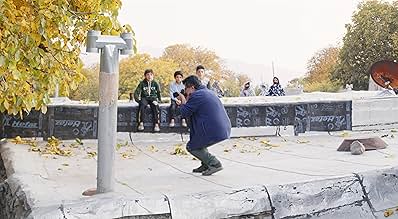IMDb RATING
7.2/10
4.7K
YOUR RATING
Two parallel love stories in which the partners are thwarted by hidden, inevitable obstacles, the force of superstition, and the mechanics of power.Two parallel love stories in which the partners are thwarted by hidden, inevitable obstacles, the force of superstition, and the mechanics of power.Two parallel love stories in which the partners are thwarted by hidden, inevitable obstacles, the force of superstition, and the mechanics of power.
- Awards
- 4 wins & 8 nominations total
Bakhtiyar Panjeei
- Bakhtiar
- (as Bakhtiar Panjei)
Narges Delaram
- Ghanbar's mother (Madar_e Ghanbar)
- (as Narjes Delaram)
Reza Heidari
- Reza
- (as Reza Heydari)
Aliye Tuzun
- Police
- (as Aliye Tüzün)
- Director
- Writer
- All cast & crew
- Production, box office & more at IMDbPro
Featured reviews
The film "No Bears" starts off simple but becomes more complex as it progresses. Even if you're not familiar with the work of Kiarostami and Makhmalbaf, you can still enjoy it. The director, Panahi, mixes documentary-style and autobiographical elements to create a powerful emotional impact. Panahi, who is at the center of the film, is forced to confront the consequences of his work, both for himself and his collaborators. The final image of the film is sobering and resonates with the unspoken anguish of an artist exiled in his own country, who has had enough. It is clear that the director has little left to lose, and this makes "No Bears" one of the best movies of the previous year.
The way Jafar Panahi successfully transcends and exceeds all the limits in his filmmaking always leaves me mind-boggled and is fascinatingly masterful. This viewing experience left me with a question "To what extent are you willing to go to tell your story?"
No Bears takes us through a powerful journey of sophisticated simplicity that expands boundaries and defies censorship restrictions both mentally and physically and in a blend of fiction and realism with a story of adaptive determination in creating, fear of crucial decisions, and passion for the story.
His ability to shape the narrative with all these elements is beyond impressive as Panahi sheds his lens on a parallel story between reality and fiction under the premise of hope, while metaphorically introducing a bigger political theme of the fear of modern authority versus the absurdity of the superstition that remains a common element in both narratives including the self-reflexively portrayal of himself as a character, which also introduces an intimate layer.
The storytelling crafts beautifully palpable emotions some of which are felt indirectly, where the sense of fear and threat are always visible and kept translating different feelings so well through an observative lens.
No Bears takes us through a powerful journey of sophisticated simplicity that expands boundaries and defies censorship restrictions both mentally and physically and in a blend of fiction and realism with a story of adaptive determination in creating, fear of crucial decisions, and passion for the story.
His ability to shape the narrative with all these elements is beyond impressive as Panahi sheds his lens on a parallel story between reality and fiction under the premise of hope, while metaphorically introducing a bigger political theme of the fear of modern authority versus the absurdity of the superstition that remains a common element in both narratives including the self-reflexively portrayal of himself as a character, which also introduces an intimate layer.
The storytelling crafts beautifully palpable emotions some of which are felt indirectly, where the sense of fear and threat are always visible and kept translating different feelings so well through an observative lens.
A masterfully crafted film that showcases the incredible talent of Iranian director Jafar Panahi. Despite facing constant harassment and a six-year prison sentence on baseless charges, Panahi continues to push the boundaries of cinema with his deeply personal and thought-provoking work.
In "No Bears," Panahi plays a fictionalized version of himself as he directs a film remotely from the Iranian village of Joban, near Turkey. When his WiFi goes out, he becomes intrigued by a local ceremony and loans one of his cameras to a villager to document it. The film then follows two parallel tracks: the story of Bakhtiar and Zara, which serves as a reconstruction of a real-life event, and the recording of the ceremony, which opens up a can of worms in the village as it is used as evidence against a young woman accused of having premarital relations.
Throughout the film, Panahi deftly explores themes of truth-telling, social activism, and the blurred lines between reality and fiction. The acting is superb, with Bakhtiar and Zara's tumultuous relationship feeling both realistic and emotionally charged. The cinematography and direction are also top-notch, with the film's remote setting adding to its sense of isolation and tension.
Overall, "No Bears" is a powerful and thought-provoking film that showcases the resilience and determination of its director. It is a must-see for fans of Panahi's work and anyone interested in the intersection of art and politics.
In "No Bears," Panahi plays a fictionalized version of himself as he directs a film remotely from the Iranian village of Joban, near Turkey. When his WiFi goes out, he becomes intrigued by a local ceremony and loans one of his cameras to a villager to document it. The film then follows two parallel tracks: the story of Bakhtiar and Zara, which serves as a reconstruction of a real-life event, and the recording of the ceremony, which opens up a can of worms in the village as it is used as evidence against a young woman accused of having premarital relations.
Throughout the film, Panahi deftly explores themes of truth-telling, social activism, and the blurred lines between reality and fiction. The acting is superb, with Bakhtiar and Zara's tumultuous relationship feeling both realistic and emotionally charged. The cinematography and direction are also top-notch, with the film's remote setting adding to its sense of isolation and tension.
Overall, "No Bears" is a powerful and thought-provoking film that showcases the resilience and determination of its director. It is a must-see for fans of Panahi's work and anyone interested in the intersection of art and politics.
No Bears is a metafictional exploration by Jafar Panahi, tackling the social and political restraints placed on himself and others. While the subject matter might seem daunting, the film is surprisingly accessible. Despite its gravity, it maintains a humble, understated tone, grounded by Panahi's calm demeanour, honesty, and politeness. Moments of dark-tinged humour-like Panahi reviewing footage accidentally left running on a camera-lighten the tension.
Panahi stars as himself, directing a film about two people attempting to migrate illegally, which is presented as a semi-documentary. In a unique twist, No Bears becomes a semi-documentary within a semi-documentary, blurring the boundaries of fiction and reality. Panahi has relocated to a small village near the Turkish border to direct remotely via webcam, as he was subject to a chronic travel ban at the time. Perhaps he sought proximity to his crew or a respite from the surveillance of Tehran. However, his interactions with the local villagers and the tensions of living near the border create a layered narrative that reflects both the film's themes and Panahi's real-life challenges. The frequent disruptions to his work caused by poor internet signal serve as a fitting metaphor for the control and limitations imposed on his creative freedom.
At its core, No Bears is a film about resistance. Panahi refuses to bow to Iranian authorities' attempts to silence him. His dealings with the villagers mirror his experiences with the regime-both characterised by arbitrary rules, superstitions, and traditions that he quietly defies. Acting as a beacon of reason, Panahi invites viewers to question the power of authoritarian systems, suggesting that their strength lies in collective compliance. The title, No Bears, reflects this theme. Villagers keep the young indoors with tales of bears prowling at night, but no such bears exist-a lie that encapsulates the broader dangers of imagined fears used as tools of control.
Panahi's calm rationality contrasts with the fabrications and self-deceptions around him. He resists not only the idea of leaving Iran to escape its constraints but also the notion that he should be forced to abandon his homeland to live freely. Why should he, or anyone, have to leave to live authentically?
Beneath Panahi's serene exterior lies a quiet yet profound frustration-his inability to fully integrate, to prevent tragedy, or to appeal to others' sense of reason. He is like Lemuel Gulliver, bound by the Lilliputians, constrained by a system of small yet unyielding forces.
Panahi stars as himself, directing a film about two people attempting to migrate illegally, which is presented as a semi-documentary. In a unique twist, No Bears becomes a semi-documentary within a semi-documentary, blurring the boundaries of fiction and reality. Panahi has relocated to a small village near the Turkish border to direct remotely via webcam, as he was subject to a chronic travel ban at the time. Perhaps he sought proximity to his crew or a respite from the surveillance of Tehran. However, his interactions with the local villagers and the tensions of living near the border create a layered narrative that reflects both the film's themes and Panahi's real-life challenges. The frequent disruptions to his work caused by poor internet signal serve as a fitting metaphor for the control and limitations imposed on his creative freedom.
At its core, No Bears is a film about resistance. Panahi refuses to bow to Iranian authorities' attempts to silence him. His dealings with the villagers mirror his experiences with the regime-both characterised by arbitrary rules, superstitions, and traditions that he quietly defies. Acting as a beacon of reason, Panahi invites viewers to question the power of authoritarian systems, suggesting that their strength lies in collective compliance. The title, No Bears, reflects this theme. Villagers keep the young indoors with tales of bears prowling at night, but no such bears exist-a lie that encapsulates the broader dangers of imagined fears used as tools of control.
Panahi's calm rationality contrasts with the fabrications and self-deceptions around him. He resists not only the idea of leaving Iran to escape its constraints but also the notion that he should be forced to abandon his homeland to live freely. Why should he, or anyone, have to leave to live authentically?
Beneath Panahi's serene exterior lies a quiet yet profound frustration-his inability to fully integrate, to prevent tragedy, or to appeal to others' sense of reason. He is like Lemuel Gulliver, bound by the Lilliputians, constrained by a system of small yet unyielding forces.
The movie "No Bears" has a sensitive and dramatic plot against the backdrop of political, religious, tradition, and cultural repression in the current Iranian world. There are two love stories told in parallel by the excellent director Jafar Panahi, who himself suffers military repression for his political movies that challenge the dictatorial Iranian government. Jafar Panahi manages to capture and transmit all the tension that Iranians suffer under the eyes of the so-called Cultural Police. We sense the pressure in the air and nobody wants to compromise or get involved or close to citizens considered traitors to the country and to the traditional customs.
Like many other incredible Iranian movies, "No Bears" is second to none in terms of quality. Simple in showing the daily life of a village and the background of filming a movie, but also bold in showing us what it's like to live in a repressive regime and not bend.
Like many other incredible Iranian movies, "No Bears" is second to none in terms of quality. Simple in showing the daily life of a village and the background of filming a movie, but also bold in showing us what it's like to live in a repressive regime and not bend.
Did you know
- TriviaActually, the entire scene shot in Istanbul Kadikoy, not in Turkish border town.
- How long is No Bears?Powered by Alexa
Details
- Release date
- Country of origin
- Languages
- Also known as
- Khers nist
- Filming locations
- Iran(location)
- Production company
- See more company credits at IMDbPro
Box office
- Gross US & Canada
- $167,333
- Opening weekend US & Canada
- $6,173
- Dec 25, 2022
- Gross worldwide
- $1,196,288
- Runtime
- 1h 46m(106 min)
- Color
- Aspect ratio
- 1.85 : 1
Contribute to this page
Suggest an edit or add missing content























